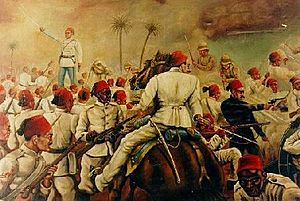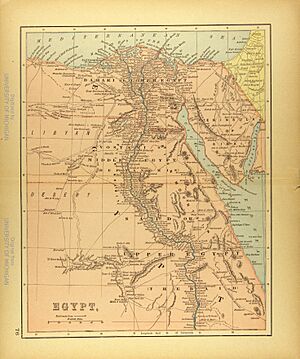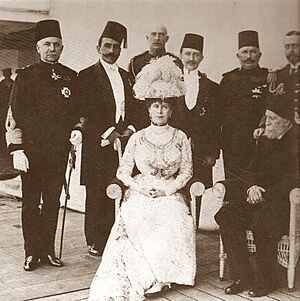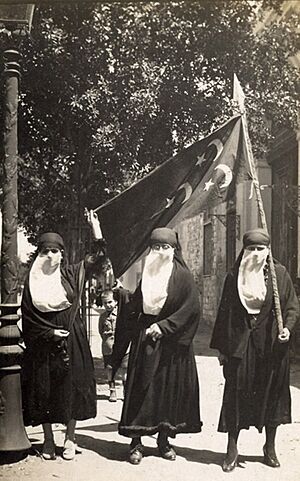History of Egypt under the British facts for kids

The history of Egypt under British rule started in 1882. That year, British forces took control of Egypt during the Anglo-Egyptian War. British influence lasted until 1956, when the last British troops left after the Suez Crisis.
At first, from 1882 to 1914, Britain's control was like a "veiled protectorate". This meant Egypt was still officially part of the Ottoman Empire. But Britain really controlled the country, even though it wasn't legally part of the British Empire. This changed in 1914 when the Ottoman Empire joined World War I against Britain. Britain then officially declared Egypt a protectorate. The ruler of Egypt, called the Khedive, was removed. His replacement, Hussein Kamel, was made Sultan of Egypt. This made Egypt independent from the Ottomans.
The official protectorate didn't last long after the war. Britain declared Egypt independent on February 28, 1922. Soon after, Sultan Fuad I became King of Egypt. However, British troops stayed in Egypt because of special agreements. This situation became official with the Anglo-Egyptian treaty of 1936. This treaty allowed Britain to keep soldiers in Egypt to protect the Suez Canal. The Suez Canal was very important for Britain's connection to India. Britain also helped train the Egyptian Army.
During World War II (1939–1945), Egypt was attacked by Italian Libya. This happened because British forces were in Egypt. Egypt itself stayed neutral until late in the war. After the war, Egypt wanted to change the treaty. But an anti-British government ended the treaty completely in October 1951. After the 1952 revolution, Britain agreed to remove its troops. By June 1956, they had all left. Later in 1956, Britain fought Egypt over the Suez Canal. But without enough international support, Britain had to back down.
Contents
British Influence in Egypt (1882–1913)
Throughout the 1800s, Egypt's rulers spent a lot of money. They built new things like canals and railways. However, much of this money was borrowed from European countries. Egypt's economy was not strong enough to pay back these huge loans. Because of this, European countries and foreign banks gained control over Egypt's money. They also took control of the Suez Canal.
By 1882, many Egyptians were unhappy with European influence. They felt that their country was losing control. This led to growing tension, especially in Egypt, which was a powerful Arab country. The Egyptian army, led by officers of Albanian and Mamluke background, also felt their power was threatened.
In September 1881, a large army protest happened. It forced the ruler, Khedive Tewfiq, to fire his Prime Minister. Many Europeans living in Egypt moved to safer areas.
In April 1882, France and Great Britain sent warships to Alexandria. They wanted to support the Khedive and protect European people and their property. Egyptian nationalists, led by Ahmed Urabi, took control of the government. They started taking over all foreign-owned businesses in Egypt. Violence against Europeans broke out in Alexandria. This caused the British navy to bombard the city.
Britain feared that other countries might get involved or that Egyptians would take over the Suez Canal. So, in August 1882, Britain sent an army from Britain and India. They landed at both ends of the Suez Canal. French forces also landed in Alexandria. The combined British, French, and Indian army easily defeated the Egyptian Army at Tel El Kebir in September. They took control of Egypt and put Khedive Tawfiq back in charge.
The main goal of the invasion was to bring back stability to Egypt. It was also to ensure that Egypt's finances were managed well, as they had been since 1876. At first, Britain probably didn't plan to stay for a long time. However, Lord Cromer, Britain's main representative in Egypt, saw financial reforms as a long-term goal. He believed that a stable economy was needed for a stable country. So, he started investing in Egypt's agriculture, especially cotton. To do this, Cromer improved the Nile River's irrigation system. He built the Aswan Dam and other barrages, and increased the number of canals for farms.
In 1906, an event called the Denshawai Incident made people question British rule. Germany used this to support anti-British groups in Egypt. For the next 25 years, Britain tried to control these groups. They also tried to create pro-British groups to slowly hand over more control. After World War I, Britain tried to give more power to less radical Egyptian groups. They invited the Wafd Party to discussions and promised full independence. British occupation officially ended in 1922. But British military control in Egypt continued until 1936.
During British control, Egypt became an important place for trade. Many people from other parts of the region moved to Egypt. These included Greeks, Jews, and Armenians. The number of foreigners in Egypt grew from 10,000 in the 1840s to over 1.5 million by the 1930s.
Egypt as a British Protectorate (1914–1922)
In 1914, Britain declared war on the Ottoman Empire. Since Egypt was still officially part of the Ottoman Empire, Britain declared Egypt a Protectorate. They removed the Khedive and replaced him with a family member, making him the Sultan of Egypt.
A group called the Wafd Delegation went to the Paris Peace Conference of 1919. They wanted Egypt to be independent. Saad Zaghlul, a political leader who later became Prime Minister, was part of this group. When the British arrested and sent the group to Malta, a huge uprising happened in Egypt.
After World War I, the large British army in Egypt was reduced. This army had been important for fighting the Ottoman Empire. With fewer British soldiers, the revolutionary groups, some supported by Germany, became more active.
From March to April 1919, there were huge protests and uprisings. This is known as the 1919 Revolution in Egypt. Protests and unrest continued daily across Egypt. Surprisingly, Egyptian women also joined the protests. They were led by Huda Sha'rawi (1879–1947), who became a leading voice for women's rights in Egypt. The first women's protest was on March 16, 1919. Another followed on March 20. Egyptian women continued to play a big role in the nationalist movement. These anti-colonial protests and the British efforts to stop them led to about 800 deaths.
In November 1919, the Milner Commission was sent to Egypt by the British. They wanted to find a solution. In 1920, Lord Milner suggested that the protectorate should be replaced by a treaty. As a result, Lord Curzon, the British Foreign Secretary, agreed to meet an Egyptian group. This group was led by Zaghlul and Adli Pasha. They discussed the proposals in London in June 1920 and reached an agreement in August 1920.
In February 1921, the British Parliament approved the agreement. Egypt was asked to send another group to London to finalize a treaty. Adli Pasha led this group, which arrived in June 1921. However, other British leaders stressed the importance of keeping control over the Suez Canal. Curzon could not convince his government to agree to the terms Adli Pasha wanted. So, the Egyptian group returned home disappointed.
Continued British Presence (1922–1956)
In December 1921, British authorities in Cairo declared martial law. They also deported Zaghlul again. This led to more protests and violence. To calm the growing nationalist feelings, and following advice from Lord Allenby, Britain declared Egypt independent. This happened on February 28, 1922. The protectorate ended, and the independent Kingdom of Egypt was formed. Sarwat Pasha became the first prime minister.
However, British influence still strongly affected Egypt's politics. Britain kept control of the Suez Canal Zone, Sudan, and Egypt's defense.
King Fuad died in 1936. His son, Farouk, became king at age sixteen. Worried by Italy's recent invasion of Ethiopia, King Farouk signed the Anglo-Egyptian Treaty. This treaty required Britain to remove all troops from Egypt, except those at the Suez Canal. These remaining troops were to leave by 1949.
During World War II, British troops used Egypt as a base for their operations in the region.
British troops moved to the Suez Canal area in 1947. But nationalist and anti-British feelings continued to grow after the war. The Egyptian Revolution of 1952 overthrew the Egyptian monarchy. It also ended the British military presence in Egypt. This led to the creation of the modern Republic of Egypt.
Languages in Egypt
During the time of British influence, French was often used as a common language. This was true among foreigners and between foreigners and Egyptians. For example, mixed French-Egyptian courts used French. Official notices from the royal family, train schedules, and legal papers were also in French. This was partly because many wealthy Egyptians studied in French schools. Also, French was a very important international language at the time.
Even though British legal staff tried, English was never made the official language of Egyptian civil courts during this period.
Images for kids
 | James B. Knighten |
 | Azellia White |
 | Willa Brown |






